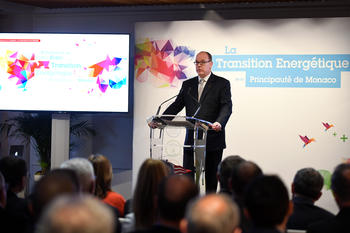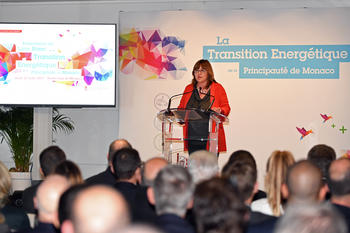- Homepage
- The Environment
- Actualités
- White Paper
White Paper on Monaco's Energy Transition
This evening, at the Yacht Club, in the presence of HSH the Sovereign Prince, Marie-Pierre Gramaglia, Minister of Public Works, the Environment and Urban Development and Jean-Luc Nguyen, Director of the Mission for Energy Transition, presented the White Paper on the Principality of Monaco's energy transition to all those involved its preparation.
Concluding this presentation, H.S.H. the Prince stressed the importance he places on the Principality's energy transition with regard to the commitments made to reduce greenhouse gas emissions by 50% by 2030 in comparison with 1990 and achieve carbon neutrality by 2050.
These objectives imply a reduction rate four times faster than that monitored to date and would require the commitment of and practical action by the entire Monegasque community. This Government policy focuses on three main areas of priority: mobility, treatment of waste and energy efficiency of buildings.
Incentives and a regulatory framework will therefore be put in place to encourage the changes in behaviour that are essential for driving Monaco towards decarbonisation. (For more information, see the attached sheet).
---
A report is available on Monaco Channel.
N.B.: the White Paper can be downloaded on the "Publications" section : Energy Transition White Paper of Monaco
--
Complementary information
Presentation of the White Paper on the
Principality of Monaco's
Energy Transition
Thursday 23 March 2017, at 6 p.m., Yacht Club of Monaco
The context
For many years, H.S.H. Prince Albert II has been involved in preserving the environment and combating climate change. On the international scene, as in Monaco, He is totally committed to adopting ambitious objectives and promoting the implementation of practical action.
The Principality successively ratified the United Nations Framework Convention on Climate Change in 1994 and the Kyoto Protocol in 2006. In 2008, the Prince's Government adopted a Climate and Energy Policy and an action programme, the Climate and Energy Plan, which received European Energy Award certification.
As a follow-up to these actions, and in the framework of the signing of the Paris Agreement in 2016, the Principality has set itself some new, very ambitious objectives:
- A 50% reduction in greenhouse gases (GHGs) by 2030 in comparison with 1990
- Carbon neutrality by 2050.
To achieve these objectives, it will be necessary to act four times faster with regard to the reduction in GHGs already achieved. This will only be possible with the support of all public and private players in Monaco.
For Monaco, energy transition involves creating conditions for changes in behaviour and projects that are more energy efficient and emit less GHG. The Mission for Energy Transition was created in 2016 to promote this approach, in conjunction with other Government departments and institutional and private players and those in the voluntary sector.
The White Paper's approach
The White Paper on Energy Transition is the first step toward involving the Monegasque community. The aim of the process is to gather the views, actions and expectations of players in Monaco in order to define a shared roadmap for energy transition, which will lead us towards 2050. This approach was developed by the Mission for Energy Transition with the assistance of the EQUINEO agency.
Based on a maintenance guide, meetings with 59 organisations (i.e. almost 90 people) were held between August and December 2016 in order to:
- Identify energy transition issues in the Principality
- Assess views on and the level of awareness of the Government's climate and energy policy
- Identify good practices undertaken by players in the Principality
- Identify the main levers for commencing energy transition and list proposals for action to be taken in the short, medium and long term.
In addition to these meetings, discussions were held to consolidate the responses in five sectors of activity: Tourism, Events and Leisure; Health; Energy and Urban Services; Economy, Shops and Businesses; and Buildings.
Points to remember ...
The reality of climate change is no longer questioned in the Principality. All stakeholders recognise the importance of this issue at the global level. Adherence to the goals set by Prince Albert II is strong, as is the desire to contribute to these goals.
Among the general challenges of energy transition, participants cited:
- the need to move towards less energy-intensive behaviour
- better communication of good practices
- the importance of dialogue
- the need for ambitious regulation and a roadmap set by the Government.
With regard to the issues that are important for Monaco's energy transition, the majority of participants identified:
- mobility
- buildings
- waste
- energy supply.
Their perception is consistent with the reality of Monaco's GHG emissions, the main sources of which are mobility, the energy consumption of buildings and the treatment of waste.
Overall, the entities consulted put forward approximately a hundred ideas for action, divided between these four main themes. For example, on mobility, participants asked for park and ride car parks at the approaches to Monaco, more charging stations for electric bicycles and rapid charging stations for electric vehicles. With regard to the buildings sector, participants asked for new regulation that reflects the objectives of the Principality's energy transition and an advisory scheme for co-owned properties. They also suggested constructing exemplary positive energy buildings in Monaco. Ideas with regard to waste included, for example, installing sorting bins in the streets, better recycling of waste and identifying new means of recycling. On the issue of energy, participants wanted local potential for renewable energy to be assessed, including solar energy, biomass and geothermal energy, and also hydrogen and wave energy.
Action by the Prince's Government
The wide consultation for the White Paper has made it possible to understand how the Monegasque community views the issues and identifies the challenges to be met with regard to Monaco's energy transition.
The government will study all the ideas submitted for action and will build on this work to create an energy transition roadmap.
This roadmap will include the introduction of incentives and a regulatory framework to encourage the changes in behaviour that are essential to drive Monaco towards decarbonisation.
A first step could be the creation of a National Pact on Energy Transition, involving institutions, public authorities and private companies. In particular, this pact should make it possible to share best practice, pool investment in installing smart equipment, raise the awareness of personnel and users, develop the infrastructure for renewable energy production and evaluate progress.
In line with the roadmap, the Government will launch a number of practical actions in the short term, such as:
- prohibiting the use of oil-fired systems for heating buildings
- updating energy regulations for new and existing buildings
- creating a platform to bring together all the information related to energy transition
(including regulations and subsidies)
- distributing a solar survey map showing the potential of all roofs in Monaco
- building exemplary positive energy public buildings.
Please note: the White Paper can be downloaded from the "Publications" section : Energy Transition White Paper of Monaco
Autres actualités du thème

H.S.H. Prince Albert II visits the photo exhibition of Responsible Trading and Restaurants in the Principality

The Prince’s Government, the Monaco Port Authority (SEPM) and the Monegasque Sanitation Company (SMA) join forces to protect the marine environment

Memorandum of understanding signed by the Secretariats of the RAMOGE and Pelagos agreements
- The latest news of the Responsible Trading and Responsible Restaurant Certifications
- A guide to banning single-use plastic bags: A bag for life
- Guide to responsible, safe bathing in the Principality
- The Tree Code
- The Environment in the Principality of Monaco – Data Compendium
- Monaco Environment booklet









